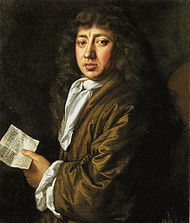
1942: Frye complains about the practice of expurgation in the Everyman editions (especially of Samuel Pepys, pictured above), and goes on to note the “wave of prudery” that seems to rise during wartime.
[81] I don’t know why I keep reading this idiotic Braybrooke Pepys, for which Everyman’s Library obtains money under false pretenses. It’s not only heavily expurgated but some of the most important musical references are left out. For the expurgation there is only the faint excuse of 19th c. publication and the facts (a) that milord B. [Braybrooke] was in the Pepys family (b) that he was presenting a historical rather than a literary document. That Everyman should ask $1.50 for this croquette is nonsense. I’d like to write an article on Everyman’s prudery sometime. Geoffrey of Monmouth; the translator’s smug smear on p. 248. Malory, according to Blunden. The Gulliver’s Travels “For Young People” has been modified. The Pepys is the worst of course, for B. [Braybrooke] has even been allowed to tamper with the family text to the extent of printing “prostitute” for “whore,” on the three-point landing principle: I remember the New Yorker’s account of a play, I think Sean O’Casey’s, where Lillian Russell was billed as a “Young Whore.” [Ed. Frye must be mistaken: Lillian Russell was 20 years older than O’Casey and died in 1922 — three years before The New Yorker began publication.] Several papers printed it as a “Young Harlot” (more cushion for sensitive moral fundaments in two syllables). One “blushed prettily and whispered ‘A Young Girl Who Has Gone Astray.'” One said “with Miss Russell and the following cast.”
[Update: According to Bob Denham, Frye means to say Lillian Gish rather than Lillian Russell. Gish did indeed play the prostitute in O’Casey’s Within the Gates in 1934.]
[82] This combined with the banning of Freud makes me wonder if we are in for a wave of prudery as a defence against the licentiousness of war. That is, it puts me in a gloomy state of mind in which I wonder. I hope we’ll continue the tendency to greater frankness and less bother about it which the popularity of, say, The Grapes of Wrath, would seem to indicate. But as people instinctively do the sillier things, there’s the danger of the huge wave of sullen prurience pouring over us again, welling up from the deep and bitter hatred of culture in our middle-class.
1950: Out with Oxford chum Rodney Baine to see a production of The Alchemist:
[574] Rodney [Baine] celebrated finishing his thesis tonight by taking us over to Tufts College to see the Oxford Players put on the The Alchemist. A group of very young people — the ages were all carefully given in the programme and the oldest was twenty-eight — were attractive (Dol Common made even Elizabethan prostitution seem attractive) and full of life and bounce.
Tomorrow: Dieppe; the rhythm of Beowulf
